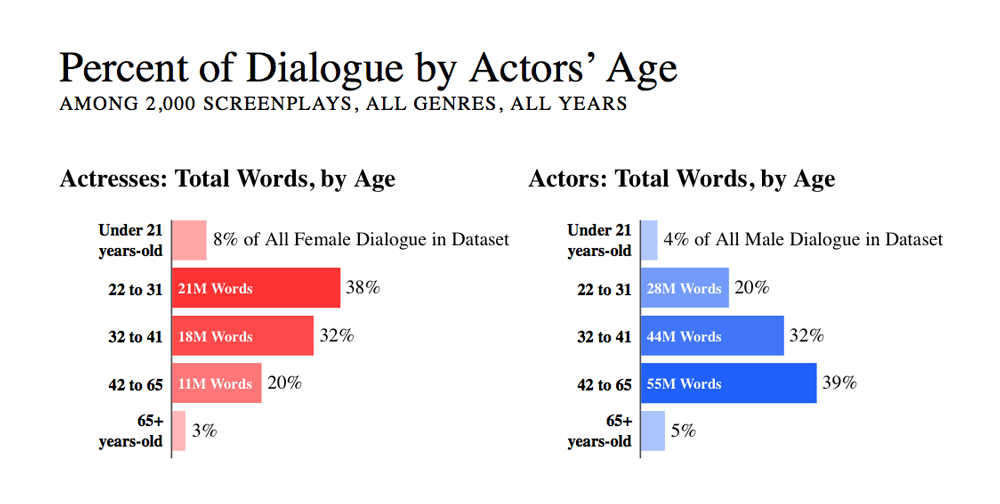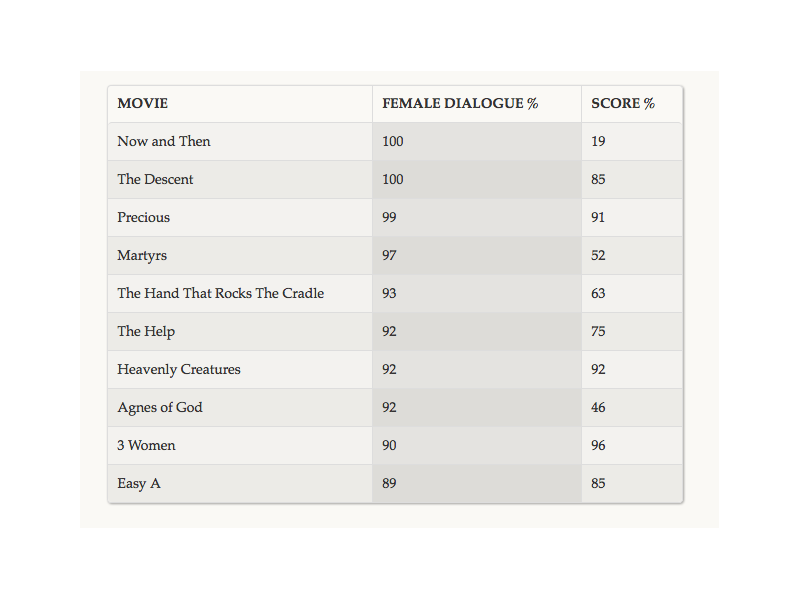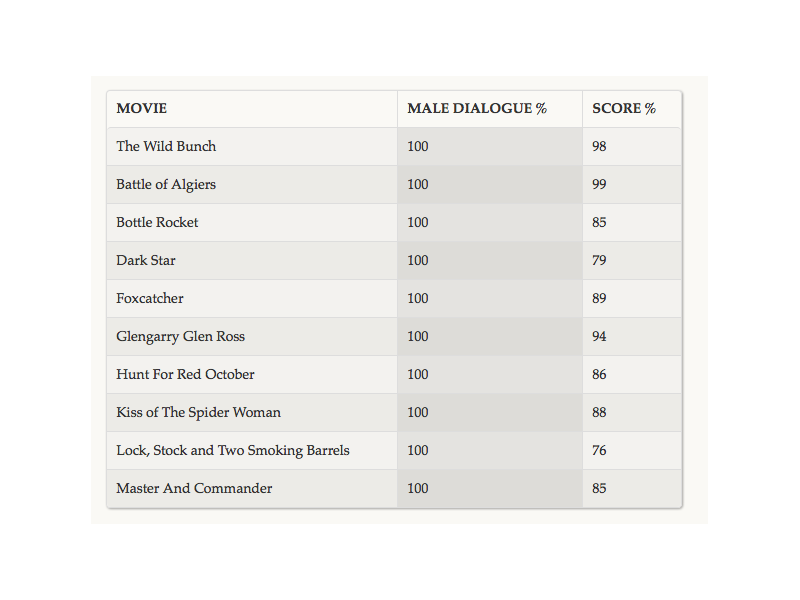Hanah Anderson and Matt Daniels did it using dialog, in an almost absurdly painstaking study.
“So we Googled our way to 8,000 screenplays and matched each character’s lines to an actor. From there, we compiled the number of words spoken by male and female characters across roughly 2,000 films, arguably the largest undertaking of script analysis, ever.”
The results are presented in some impressive but confusing infographics, to which you could lose a good few hours, like I did. The data sources are listed in aGoogle Docs spreadsheet, the raw data is available from Github, and there’s anFAQ on the methodology, which answers most nitpicks.
Anderson and Daniels took every character with 100 or more lines of dialog, and mapped them to the actual actor’s page on IMDb. This was done to improve accuracy, “because minor characters are poorly labeled on IMDb pages.” Even so, there are several factors that make 100% accuracy difficult—the finished movie may differ from the referenced script, for example. Or, says the authors, a movie may have an important character that has relatively little dialog, skewing the results. Despite these issues, the authors say, “We believe the results are still directionally accurate, but individual films will definitely have errors.”
The first interesting—though not particularly shocking—result is that movies are almost all male dominated. “Across thousands of films in our dataset, it was hard to find a subset that didn’t over-index male. Even romantic comedies have dialogue that is, on average, 58% male.” This is because there are lots of male supporting characters.
What about women in lead roles?
“In 22% of our films, actresses had the most amount of dialogue (i.e., they were the lead). Women are more likely to be in the second place for most amount of dialogue, which occurs in 34% of films. The most abysmal stat is when women occupy at least two of the top three roles in a film, which occurs in 18% of our films. That same scenario for men occurs in about 82% of films.”
The study also looked at the age of actors in movies. The result is pretty obvious when you look at this one chart.

As men age, they get more dialog. As women age, they get less. This quantifies what we already know based on watching films—there are way fewer roles for aging women than for aging men. In fact, older men seem to get better and more interesting roles than younger men.
THE MOVIES
Of the 2,000 screenplays, only two had 100% female dialog: Now and Then andThe Descent. In contrast, you’ll find 54 100% male movies, including Stand By Meand There Will Be Blood. The chart shows that Hollywood has a clear bias toward male-dominated movies.
Broken down by genre, things get worse. Take action movies. In Charlie’s Angels, a movie with three female leads, women only get 66% of the dialog. OnlyCatwoman beats its—at 68%—with no movie getting close to 100%. There are 12 100% male movies. Interestingly, while horror movies still skew male, there are proportionally more female-dominated horror films than in comedy. In fact, one of the 100% female films is a horror flick—The Descent. Drama, a genre that you might think of as more neutral, gender-wise, is equally heavily biased toward male dialog, with few female-driven titles.
I took some of the “most male” and “most female” movies and looked up their popularity. I used Rotten Tomatoes for the score. For the top 10 movies, I included all the 100% female films, then worked down through the highest percentiles. Because there are so many male movies, and no way to sort the data, I grabbed them in order, from the top of the list.
Female Movies

Male Movies

The first thing that jumps out of these charts is that the 100% male movies are almost all highly rated, whereas the top 10 female movies list contains some real dogs, critically. Martyrs, a movie with 97% female dialog, only managed a 52% rating on the Tomatometer. That’s not really surprising, when you read the movie’s tagline:
“A real polarizing movie, this Gallic torture-porn is graphic, brutal, nasty, and gruesome and not to everyone’s taste.”
By contrast, the male top 10 is (mostly) full of classics. Clearly this is because there are so many more titles to choose from on the male side of things, but that only illustrates how bad the situation is.
Are things getting better, at least? Decade by decade, the percentage of female dialog has increased. In the 1980s, there were just 11 films in the 60% to 90% female dialog range, where the bulk of movies fall. In the 1990s, the number rose to 33; in the 2000s, 53; and in this decade so far, we already have 57 female-dominated movies. That’s great, but this decade there have already been 67 movies over in the 90%+ male category, which is more than all the female-skewed movies added together.
Movies that are firmly 100% male are fine, of course. After all, this is storytelling, and stories don’t always need to be balanced. But it would be nice to see more movies with strong female roles, or all-female casts, if only because it would make the stories more interesting. One of the best side effects of the recent rise of LGBTQ characters and storylines in TV series has been the life they’ve injected into the stories. Even tired, old TV plot ideas become interesting again when explored from a different point of view. If nothing else, more female roles in movies could allow Hollywood to recycle its back catalog once again. That’s a cynical take, but also a realistic one.

